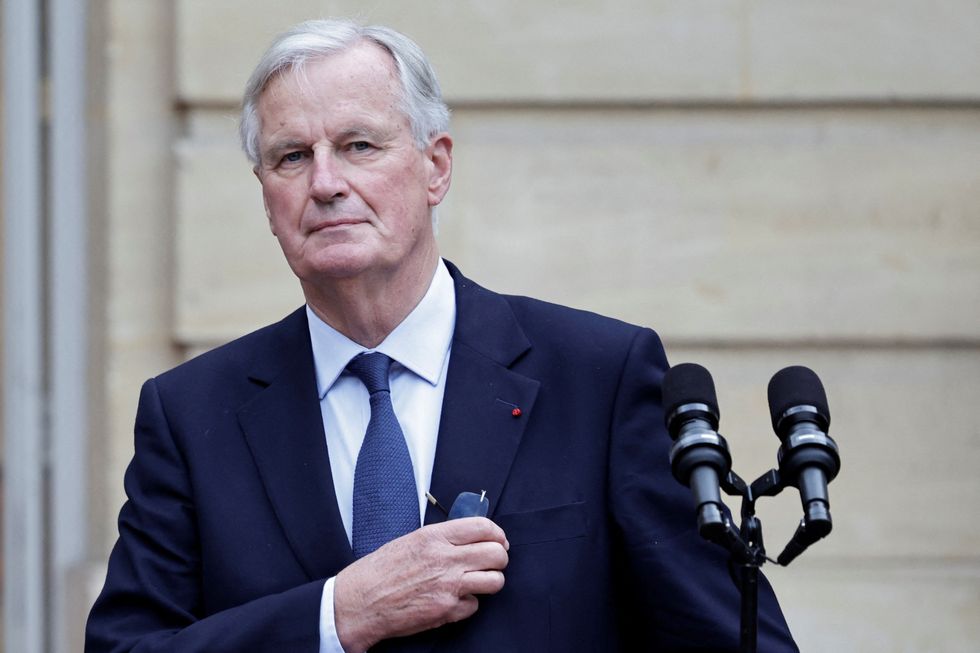France’s President Emmanuel Macron previously opposed tax increases
Reuters
France's new prime minister, Michel Barnier, faces a tough challenge to try and fix the country's widening budget deficit
Don't Miss
Most Read
Trending on GB News
The newly appointed French Prime Minister Michel Barnier has been appointed with the brutal task of fixing the country’s finances.
To do so, the prime minister is opening the door to higher taxes on businesses and the rich, to plug France’s widening budget deficit.
Barnier is under pressure from both Brussels and Paris with one side pushing EU-imposed budget cuts while in France, he is running a minority government opposed by parties demanding more spending.
France’s president, Emmanuel Macron, is under pressure to act as borrowing costs for France soared Tuesday to their highest level since the 2008 financial crisis, as investors increased the premium they demand to hold French debt.

France's newly appointed Prime minister Michel Barnier has been tasked with fixing the country's finances
ReutersThe government is also facing ballooning debt and deficit that have become one of the highest in Europe.
The prospect of “targeted levies” on France’s wealthiest was revealed by Antoine Armand, Barnier’s new finance minister.
He said that pushing ahead with the policy was necessary as France faces “one of the worst deficits in our history.”
Armand told France Inter Radio on Tuesday: “We will work to match the seriousness of the situation.
“Targeted levies on the wealthiest households are being studied. Targeted levies on businesses...are also being considered.
He continued: “People who have very significant assets, who sometimes do not pay a lot of taxes, perhaps they can contribute more.”
Armand and the new budget minister Laurent Saint-Martin are planning potential tax rises to submit to Barnier in preparation for the 2025 budget to be presented in parliament next month.
This will be a test for Barnier in his new position as opposition parties have threatened no-confidence motions against his government if they disagree with spending choices.
Raising taxes on the rich would be a major turn in Macron’s economic policy since he was elected in 2017. Macron was nicknamed the "president of the rich" as he cut taxes on companies and curbed national wealth tax.
For example, Macron stirred up controversy when he watered down a wealth tax on the rich by replacing it with a tax on real estate assets valued at over 1.3 million euros.
The president has previously opposed tax increases calling the urge to do so “a very French disease,” but Barnier has said there is no choice.
Barnier needs to find an astonishing €110 billion in savings over the next few years to bring France’s deficit back in line with European Union rules meaning slashing government spending.

Finance minister Antoine Armand said pushing ahead with the policy was necessary as France faces “one of the worst deficits in our history"
Reuters
LATEST FROM MEMBERSHIP:
Among areas being explored are increasing the flat tax to as much as 35 per cent, which French economists say could bring €300 million in new revenue.
A temporary tax on “superprofits” earned by corporations could also be considered, a plan that Macron raised and abandoned years ago.
French businesses are generally supportive of higher taxes, with conditions.
Patrick Martin, the president of Medef, France’s leading employers’ organisation, said he was “ready to discuss” tax increases for businesses on condition that the government would also reduce spending and not enact policies that would penalise investment and employment.
In a briefing with reporters on Monday, Rodolphe Saade, the chief executive of the CMA CGM shipping empire said his company would “pay its part” and make a one-off payment to help mend France’s tattered finances as long as there were not more significant changes to the tax code.
You may like







